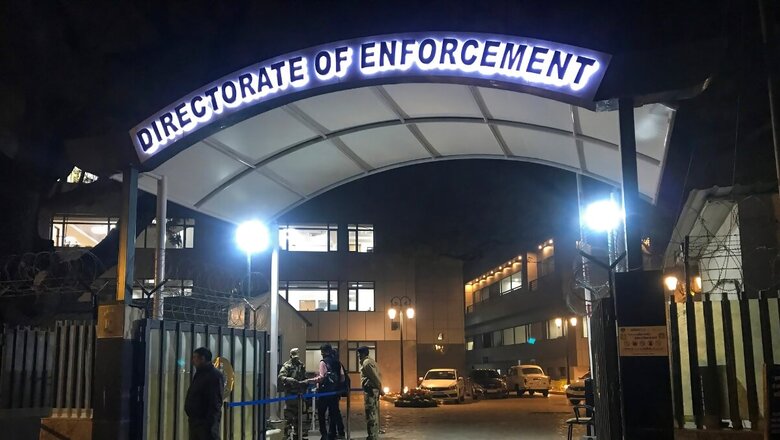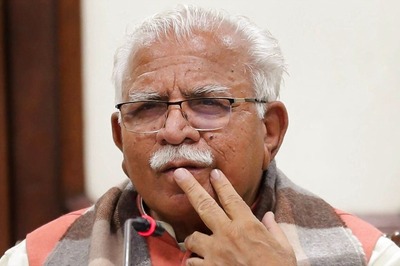
views
The amount of money laundered from India to China and Dubai through several scams that include cyber frauds, the related cases, investigations, and detection documents are going to contribute significantly to the review process of the Financial Action Task Force (FATF) due this November, News18 has learnt. Over the past five years, the Enforcement Directorate has been investigating around 25 money laundering cases for which the trails led to China, that include Chinese companies, organisations, and individuals or businessmen aligned with the interests of Beijing, said a senior officer in the directorate. The numbers are significant as one case may have over 40 to 50 FIRs clubbed and affected thousands of people or many organisations, including government ones.
While communication and cooperation from China do not happen directly, as sometimes the trails are routed through multiple foreign locations, India keeps sending communications to West Asian countries as and when the laundering or money trails lead the agency to those nations.
According to the senior ED officer, of the total communications or cooperation requests sent by India to several countries, around 18% of them were sent to West Asian nations. Dubai tops the charts in the region as it is believed to be the hub of money laundering.
For the review and assessment process, the assessee country needs to present a few case studies—which include investigation, detection, and prevention by concerned agencies, new regulations it brought, amendments to money laundering laws if any, fresh legislation to strengthen anti-money laundering regime—to continue as a member of FATF, a positive appraisal rating.
FATF parameters
Even though there are several parameters and hazards a country like India may face and present before the FATF during the review, money laundering, and terror financing are likely to be categorised as the “major risk factors” the nation has been experiencing. The review will be based on the investigation mechanism India has put in place and the measures it has taken to be compliant with the recommendations FATF put during its last assessment in 2010.
Among several central agencies, banks, regulators like SEBI, and some other entities, the Enforcement Directorate (ED) has been playing a major role in the review process. In India, ED is the only agency responsible for money laundering investigations, confiscation, and terror financing probes.
For context, this was the reason that prompted the government to move an application before the Supreme Court pleading for an extension of tenure for ED director Sanjay Mishra, said officials. In the application, the government mentioned that it was “compelled to approach the Supreme Court seeking extension of the tenure of Sanjay Mishra up to October 15, 2023, in view of the ongoing FATF review which is at a critical stage”. Mishra has been leading the preparations for the review process and submissions on the effectiveness and efficiency of the anti-money laundering regime in India. The submissions were made on July 21, while the visit by the FATF assessment team is due in November.
What is FATF review and why is it important for India?
The Financial Action Task Force (FATF) leads global action to tackle money laundering, terrorist, and proliferation financing. The FATF researches how money is laundered and terrorism is funded, promotes global standards to mitigate the risks, and assesses whether countries are taking effective action, says the organisation’s official website.
The review is mandated to decide how a country’s prevention mechanism for money laundering and terror financing works. It includes the investigation and detection mechanism for money laundering and terror financing, international cyber frauds, and so on. It also includes how far the confiscation and attachment procedures work effectively on the ground, the legislations, and regulations to choke or arrest terror financing or money laundering.
Another senior ED officer explained why this review is crucial for India’s international image .”A strong Anti-Money Laundering (AML) and combating the Financing of Terrorism regime is crucial for enhancing its international standing. Complying with FATF recommendations is very high on India’s priority list,” said the officer on condition of anonymity.
What did the last FATF review (2010) say about India?
The FATF evaluation report lists the assessments and the recommendations. According to the report, the mutual evaluation of India says, “The AML/CFT regime in India is relatively young. The Prevention of Money Laundering Act, 2002 (PMLA) came into force in 2005 and was amended in 2009. The Unlawful Activities (Prevention) Act, 1967 (UAPA), was amended in 2004 to criminalise, inter alia, terrorist financing. The UAPA was further amended in December 2008 to broaden its scope and to bring the legislation more in line with the requirements of the United Nations Convention for the Suppression of the Financing of Terrorism (FT Convention).”
The key findings include that India continues to be a significant target for terrorist groups and has been the victim of numerous attacks. “There are no published figures of terrorist cells operating in the country. Since mid-2009, India has increased its focus on money laundering and the use of the ML provisions. However, there are still some important and in some instances, long-standing legal issues, such as the threshold condition for domestic predicate offences, that remain to be resolved. Effectiveness concerns are primarily raised by the absence of any ML convictions,” says the report.
It also states that From a law enforcement perspective, this commitment is reflected in an active pursuit of the financial aspects of terrorism. “At the prosecutorial level, an appropriate focus on FT can be observed. However, this effort has not yet been convincingly followed up by convictions and firm case law,” the report says. “With the exception of casinos (which operate only in the State of Goa), the Designated Non Financial Businesses and Professions sectors are not subject to the PMLA and are not regulated and supervised for AML/CFT purposes.”
Among several recommendations, the FATF mentioned that India should “address the technical shortcomings in the criminalisation of both money laundering and terrorist financing and in the domestic framework of confiscation and provisional measures…”
What is China’s FATF rating?
The evaluation report for China says that it is compliant with nine of the forty recommendations.
“Since the 2019 assessment of the effectiveness of China’s measures to combat money laundering and terrorist financing, the country reported back to the FATF in 2020 and 2021 on the actions taken to strengthen its AML/CFT framework. As a result of these reports, the FATF rerated the Country on a number of the 40 Recommendations,” mentions the report. “Today, China is compliant on 9 of the 40 Recommendations and largely compliant on 22 of them. It remains partially compliant on 3 Recommendations and non-compliant on 6 Recommendations.”




















Comments
0 comment